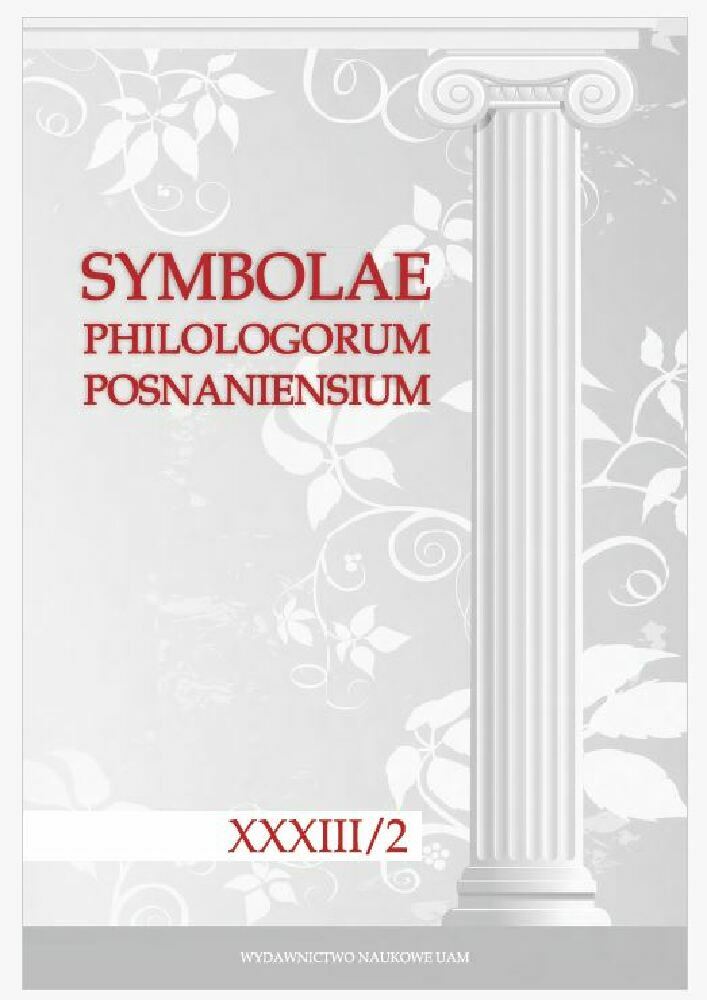Abstrakt
At first glance, Curculio is no different from other Plautine parasites. However, the uniqueness of this character lies not so much in his characteristics as in the way Plautus uses him on stage. Curculio disguises himself as the soldier, and by playing the role of servus currens, he takes on the role of a slave. Moreover, by reporting offstage conversations, he doubles as some of the other characters in the comedy. Curculio’s stage movement and its influence on the comings and goings of the other characters make one look at this character as the author of the structure of the entire comedy. Moreover, his rants about bankers and pimps make him the porte-parole of Plautus himself.
Bibliografia
Andreau, J. 1968: Banque greque et banque romaine dans le théâtre de Plaute et de Térence. Mélanges d’Archéologie et d’Histoire de l’École Française de Rome 80: 461–526. DOI: https://doi.org/10.3406/mefr.1968.7559
Copley, F. O. 1942: On the Origin of Certain Features of the Peraclausithyron, “Transactions and Proceedings of the American Philological Association” 73, ss. 96–107. DOI: https://doi.org/10.2307/283540
de Melo, W. 2011: Plautus, Curculio, Edited and Translated by Wolfgang de Melo, Harvard University Press, The Loeb Library 2011, s. 219–313.
Gellar-Goad, T. H. M. 2021: Plautus, Curculio, Bloomsbury Ancient Comedy Companions, London 2021. DOI: https://doi.org/10.5040/9781350079779
Fantham, E. 1965: The “Curculio” of Plautus: An Illustration of Plautine Methods in Adaptation, “The Classical Quarterly” 15/1, ss. 84–100. DOI: https://doi.org/10.1017/S0009838800008739
Fontaine, M. 2010: Funny Words in Plautine Comedy, Oxford; New York: 2010. DOI: https://doi.org/10.1093/acprof:oso/9780195341447.001.0001
Marshall, C. W. 2006: The stagecraft and performance of Roman comedy. Cambridge: Cambridge University Press, 2006. DOI: https://doi.org/10.1017/CBO9780511486203
McCarthy, K. 2000: Slaves, Masters, and the Art of Authority in Plautine Comedy, Princeton University Press, Princeton and Oxford 2000. DOI: https://doi.org/10.1515/9781400824700
Mendelsohn, Ch. J. 1907: Studies in the Word-Play in Plautus, Philadelphia 1907.
Moore, T.J. 1998: The Theatre of Plautus: Playing to the Audience, University of Texas Press, Austin 1998.
Papaioannou, S. 2009: What’s in a name? The real identity of Palinurus in Plautus’ “Curculio”, “The Classical Journal” 104/2 (2008/09) ss. 111–22. DOI: https://doi.org/10.1353/tcj.2008.0059
Sharrock, A. 2009: Reading Roman Comedy. Poetics and Playfulness in Plautus and Terence, Cambridge: Cambridge University Press, 2009. DOI: https://doi.org/10.1017/CBO9780511635588
Stockert, W. 1983: T. Maccius Plautus, Aulularia, Heraugegeben und erklärt von Walter Stockert, Teubner, Stuttgart 1983. DOI: https://doi.org/10.1007/978-3-663-05506-8
Weissar, T. 2019: Hra “Curculio” a jeji rozbor, in: Titus Maccius Plautus, Curculio aneb Darmojed, Praha 2019.
Urbanová, D. / Poláčkowá, E. / Weissar T. / Černoch R. 2019: Titus Maccius Plautus, Curculio aneb Darmojed, Praha 2019.
Wright, J. 1993: Plautus’ Curculio, Revised Edition with Introduction and Notes by John Wright, University of Oklahoma Press: Norman and London 1993.
Licencja
Prawa autorskie (c) 2023 Ewa Skwara

Utwór dostępny jest na licencji Creative Commons Uznanie autorstwa 4.0 Międzynarodowe.

